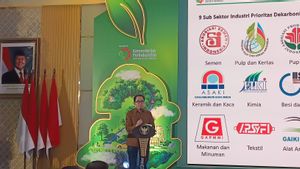SAMOSIR - Director of BI's Monetary Economic Policy Department, July Budi Winantya, said that BI continues to monitor developments in the United States' benchmark interest rate and the escalating global geopolitical situation as indicators for considering policy responses.
According to July, these two things are needed as indicators for BI's consideration in deciding to increase the BI-Rate interest rate to maintain the stability of the rupiah exchange rate.
BI estimates that the rupiah will remain stable at around IDR 16,200 per US dollar in the second quarter of 2024, IDR 16,000 per US dollar in the third quarter of 2024 and IDR 15,800 per US dollar in the fourth quarter of 2024.
Meanwhile, based on transaction data from April 22-25 2024, foreign investors in the domestic financial market recorded net sales of IDR 2.47 trillion. The selling action of non-resident investors has decreased drastically when compared to the period 16-18 April 2024 which reached IDR 21.46 trillion.
However, from the beginning of 2024 to April 25, 2024, foreign investors in the domestic financial market recorded net sales worth IDR 28.56 trillion. This consists of net selling of IDR 47.26 trillion on the Government Securities (SBN) market, net buying of IDR 9.68 trillion on the stock market, and net buying of IDR 9.02 trillion on Bank Indonesia Rupiah Securities (SRBI).
Juli said that the strengthening of the rupiah would be in line with the inflow of foreign capital. Therefore, it is hoped that an increase in interest rates in the long term will make the rupiah strengthen again.
"In terms of encouraging growth, there are other instruments that will later be given incentives," said Juli at a discussion on Recent Economic Developments and BI's Policy Mix Response, in Samosir Regency, North Sumatra, Sunday, April 28.
Therefore, July assesses that the impact of increasing interest rates on the real sector and economic growth is relatively limited.
Apart from that, in the second quarter of 2024 and the third quarter of 2024, it is estimated that economic growth will still be higher than the fourth quarter of 2023 at 5.04 percent. Overall, Indonesia's economic growth is predicted to range from 4.7 percent to 5.5 percent in 2024.
Juli said that with the Macroprudential Liquidity Incentive Policy (KLM), BI estimates that there will be additional banking liquidity of IDR 81 trillion by mid-2024. Therefore, the total incentives provided will be IDR 246 trillion.
"This policy will be provided to the banking sector which distributes credit to leveraged sectors and has a low-risk profile," he explained.
SEE ALSO:
Likewise, PT Bank Central Asia Tbk (BCA) Economist David Sumual said that this additional liquidity could be utilized by the banking industry and could have a domino effect on the national economy.
According to David, the increase in the BI-Rate benchmark interest rate is not considered to have a significant effect on bank credit interest rates.
"We also project economic growth of around 5-5.2 percent. From the credit side, relative credit growth is around 10 percent. "So, there is no significant impact (from an increase in the benchmark interest rate) as long as the variables move drastically which can affect expectations," he said.
The English, Chinese, Japanese, Arabic, and French versions are automatically generated by the AI. So there may still be inaccuracies in translating, please always see Indonesian as our main language. (system supported by DigitalSiber.id)
















